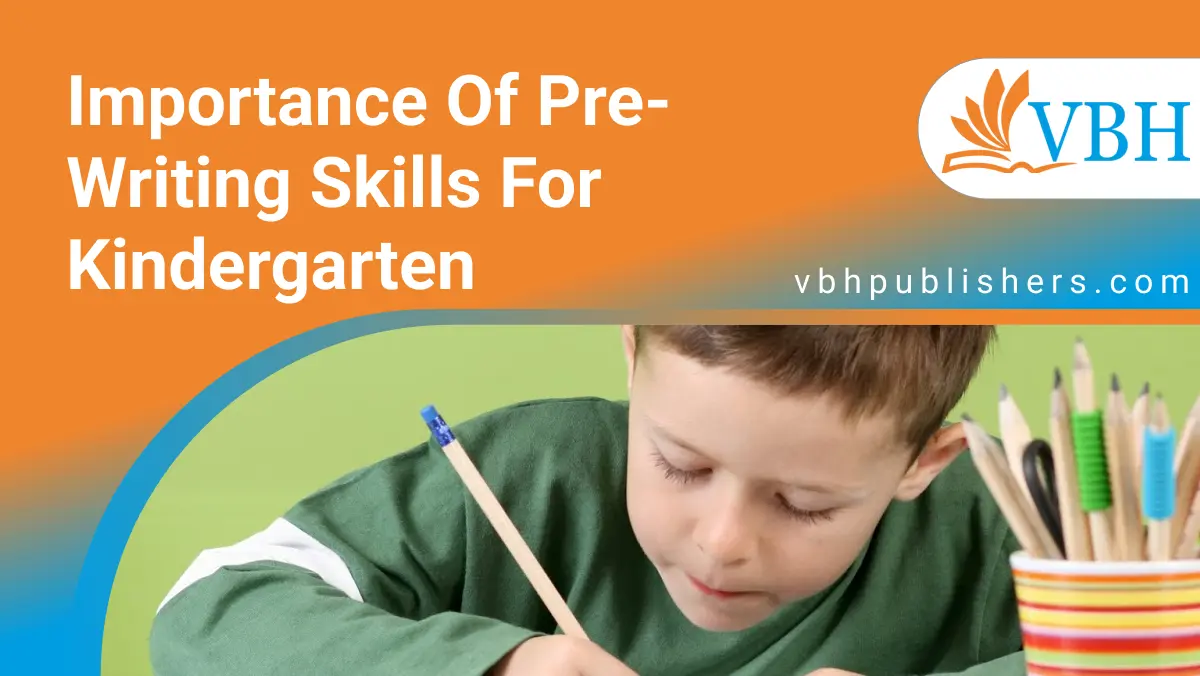Importance of Pre-Writing Skills for Kindergarten
- Last Updated:

You probably found it nearly impossible if you’ve ever tried to get your five-year-old to write their name. Some children can do this in Preschool or Kindergarten, while others can’t complete this task until they’re seven or eight years old. It all comes down to pre-writing skills—the ability to form letters with their hands before even picking up a pencil and writing on paper.
These skills develop over time and are enhanced with practice, but practicing does require some guidance from parents and educators alike.
The key focus of preschool enhancement is more on developing the fine motor skills that are needed for handwriting. You can give your child a simple writing instrument like a pencil he/she should scrabble on the paper as a tool to play. When these causal activities of holding a pencil and scribbling on the paper will increase a child’s willingness to draw or write.
You can buy any pre-writing skills activity books and start learning with your child from the initial stage when he/she starts growing at the age of 2+ at this age, they will start developing their fine motor developmental skills. These skills will surely help them to excel in the future when they step into their first school.
The transition from pre-K to kindergarten can be pretty exciting, but it can also be nerve-wracking because you’re walking into something new and different from what you’re used to. If your child has not mastered pre-writing skills in pre-K, they may have a tough time managing the transition to kindergarten and might even struggle throughout the first few years of elementary school.
Follow this guide on the importance of pre-writing skills so that your child gets off on the right foot when entering kindergarten.
What are Pre-Writing Skills?
Pre-Writing Activities are combined with a set of fundamental skills that helps the children to write when they are ready developmentally. These skills should be brushed up with your child when they start communicating with you. The communication process among children starts when they are nearly approx 1 year of age.
You can gradually adopt this Pre-Writing Skills technique when your child grows in year 1 then gradually increase the activity to grow their skills more efficiently.
A few skills need to be put into them before they are ready to start formal writing
- Develop fine motor skills
- Adapt finger-hand strength
- Holding Pencil instruments like color pencil, or wooden pencil makes the finger strength flexible to hold them firmly and correctly
- Focus on hand-eye coordination
- More stress on bilateral coordination
- Always accept learning good posture
- Accepting more visual perception practice
- More creative enhancement for IQ development
- Boost confidence
Teaching a child only does not mean only writing with letter formation, but rather they need to accept different creative pre-writing skills first.

Why Pre-Writing Skills Activities for Preschoolers is more Effective?
Pre-writing skills activities for preschoolers are more effective because the sequence for teaching the children is very systematic. It usually starts from simple to complex, starting around 2+ years of age start learning with a vertical line going up to the triangle by age 5+. More focus on Scribbling, tracing shapes and patterns, Drawing and Coloring, joining the dots, and copying lines are a few pre-writing activities that are only meant for the kindergartener.
To write more fluently, a child must have good control and firm hand, wrist, and finger movements. For that need, a child has to develop fine motor skill development.
How you can develop your child’s fine motor skill development?
- Activities like scribbling or drawing on the floor
- Can use the blackboard great for developing motor skills
- Can use tweezers and tongs in pinching movements
- Making shapes in water and sand
- Cutting different shapes and sizes using scissors
These are a few pre-writing activities, that can enhance fine motor skill development within a child.
You can add a few movement-based pre-writing skills activities to develop fine motor skills in preschoolers as well.
- Climbing
- Rolling
- Hopping
- Pulling
- Balancing
- Riding
- Running
Advantages of Pre-Writing Activities
Gross motor play is very much important to children because through these activities their bodies will have a great vibe, postural control, and strength as physical activities are more focused here. For that, it is essential to adopt pre-writing and handwriting skills. Activities with cross the mid-line enhance the perfect coordination and communication of the left and right hemispheres of the brain.
More exposure to outdoor play with crawl and climb spaces develops gross motor skills and cross-lateral movement. Activities for upper limb strengthening that includes wheelbarrow walking can be added for their motor skills development. Increasing the visual motor skills including functional visual skills such as eye tracking and eye-hand coordination is a must.
Sign that a Child Needs to Develop Pre-Writing Skills
- Feeling uncomfortable pencil grip; difficulty in holding a pencil for writing, drawing, or coloring.
- A child inclined to use the whole hand instead of a few fingers for manipulating objects
- Untidy handwriting or lack of willingness to color going out of the Frameline.
- Lack of interest or not willing to participate in writing activities but anyhow verbally skilled
- Feeling too much pressure or overburden on the writing instrument.
When a child faces difficulties while writing and drawing that makes indirect signs of frustration or low self-esteem and not showing any interest in writing activity or no neatness or no writing clarity. That could surely affect academic performance in the future. So always encourage your child to accept pre-writing skills so that he/she can get rid of all these writing difficulties.
How to Enhance Prewriting Skills?
Practice making the man perfect make your child Practice, practice, practice!! Give your child a writing instrument and make them practice. It makes your child perfect and strengthens the finger, wrist, and hand muscles. And these pre-writing skills activities will also develop hand-eye coordination.
You can add screen-free activities like structured learning that also can build their fine motor skills. Either they accept it through play or any helping things out around the house.
Conclusion
Make your child more sensible and creative with the best pre-writing activities. So that their all-motor development skills enhance effectively. VBH publisher offers you and your kid many pre-writing activities books that you can buy at a cheap price. Read this blog and know the importance of Pre-Writing Skills for Kindergarten.
Frequently Asked Questions
The five pre-writing skills are:
- Brainstorming: Generating ideas and concepts related to the writing topic.
- Freewriting: Writing down anything that comes to mind without worrying about grammar, spelling, or organization.
- Clustering/Mind Mapping: Creating a visual representation of the writing topic and related ideas by mapping them out in a diagram.
- Outlining: Organizing ideas into a structured outline or framework to guide the writing process.
- Researching: Gathering information and data related to the writing topic to inform the writing process.
Pre-writing skills are important because they help writers organize their thoughts, ideas, and information before starting to write. By engaging in pre-writing activities, writers can create a plan or framework for their writing, which can help them write more effectively, efficiently, and coherently. Pre-writing also helps writers overcome writer’s block and generate new ideas, leading to more creative and compelling writing.
Pre-writing skills and pre-reading skills are the foundational skills required for successful reading and writing. Pre-writing skills involve activities that help writers organize their thoughts, ideas, and information before starting to write. Pre-reading skills, on the other hand, involve activities that help readers prepare to read by previewing the text, identifying the main idea, and making predictions about what the text will cover.



